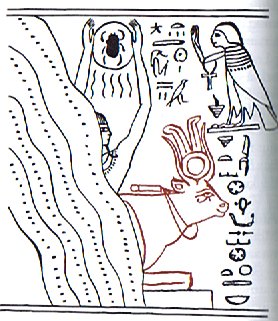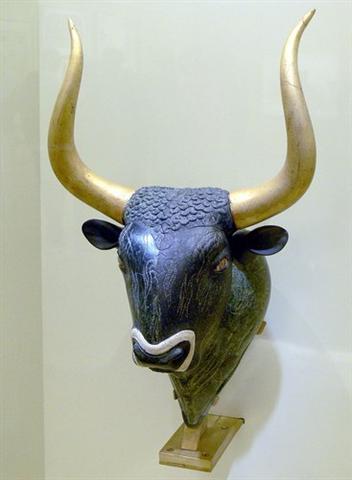162. If heliacal Lesath (ν
Scorpii) marked the end of a sequence of 377
right ascension days, then the remaining 3
(= 14 - 11) niu glyphs in the text
could belong in a year measuring 12 * 29½
nights, beginning with Cb2-10:
|
Julius Caesar (nighttime) |
373 |
Gregory XIII (daytime) |
 |
 |
 |
 |
|
Ca2-24 (50) |
Ca2-25 |
Cb2-8 (400 + 25) |
Cb2-9 (34 = 25 + 9) |
|
niu -
kupega hia mai |
tu te niu - ku huki |
Niu |
|
CLOSE TO THE FULL MOON |
INVISIBLY CLOSE TO THE SUN |
|
ALGENIB PERSEI |
May 11 (314 - 183, *51) |
Nov 19, 16h
(243.5) |
LESATH
(324) |
|
'April 13 (→ 413) |
4-14 (→ 41.4) |
ºNov 15 |
16 (320 = 260 + 60) |
|
"March 30 (*9 = *50 - 41) |
31 (90 = 131 - 41) |
"Oct 9 (*202) |
10 (283 = 90 + 375 - 182) |
|
3-7 (*352 = *366 - 14) |
MARCH 8 (67 = 80 - 13) |
SEPT 16 |
17 (260 = 324 - 64) |
|
46 (= 130 - 84) |
47 = 67 - 20 |
239 (= 47 + 374 - 182) |
240 (= 324 - 84) |
|
377 |
|
The
difference in precessional
time depth between the Pope
and Julius Caesar was *27 -
*4 = *23. |
|
... The ordinary year in the
previous Roman calendar
consisted of 12 months, for
a total of 355 days. In
addition, a 27-day
intercalary month, the
Mensis Intercalaris, was
sometimes inserted between
February and March. This
intercalary month was formed
by inserting 22 days after
the first 23 or 24 days of
February; the last five days
of February, which counted
down toward the start of
March, became the last five
days of Intercalaris. The
net effect was to add 22 or
23 days to the year, forming
an intercalary year of 377
or 378 days ...
740 (total number of glyphs
on the C tablet) - 377 = 363
(= 3 * 121). And 377 - 23 =
354 (= 12 * 29½).
If, however, also the day of Sirrah at
position zero in the text should be
counted, then 1 + 740 = 741 = 19 * 39 =
364 + 377. |
Let's assume the intention was to count
also position zero in the text. A year
with 364 days could then in principle
have begun with Cb2-10 at position 1 +
426 - 377 = *50, i.e. with May 10 at
Algenib Persei:
 |
 |
 |
|
Cb2-10 |
Cb2-11 (36) |
Cb2-12 (429) |
|
moe te goe |
ka moe i
roto |
te henua |
|
CLOSE TO THE FULL MOON |
|
ALGENIB PERSEI |
May 11 (314 - 183, *51) |
12 |
|
'April 13 (→ 413) |
4-14 (→ 41.4) |
15 |
|
"March 30 (*9 = *50 - 41) |
31 (90 = 131 - 41) |
"April 1 |
|
3-7 (*352 = *366 - 14) |
MARCH 8 (67 = 80 - 13) |
9 |
|
46 (= 130 - 84) |
47 = 67 - 20 |
48 |
South of the equator, on Easter
Island, and half a year later in
November they would have observed Algenib
Persei close to the Full Moon in order to find
their own corresponding spring season.
However, as Algenib Persei probably had
already been placed at Cb1-23 it would be
rather strange if the star should return again only after 12
(= 377 - 365) days:
 |
 |
 |
|
ko te rima |
kua oo ki
te vai |
ma te ua |
|
Cb1-22 |
Cb1-23 |
Cb1-24 |
|
CLOSE TO THE FULL MOON (and
nakshatra dates): |
|
*49 |
ALGENIB PERSEI
= α Persei
GIENAH (γ Corvi) |
*51 |
|
May 9 |
10 (130) |
11 |
|
ºMay 5 |
6 |
7 |
|
'April 12 |
4-13 (→ 14 * 29½) |
14 (104 = 314 - 183 - 27) |
|
"March 29 (88) |
30 |
31 |
|
MARCH 6 |
7 (66 = 130 - 64) |
8 |
|
45 |
46 = 130 - 84 |
47 |

|
18 |
27 |
38 |
38 |
= 121 (= 11 * 11) |
The number of
'rain droplets' in the 4
'rivers of time' above are
here 121 as in ºMay 1
(Algol) or as in Cb1-21
(Zuben Elschemali).
Hat-hor
(the House of Horus) emerged
after 11 * 11 dark nights.
But she could not be
observed before night number
121 + 16 = 137. In ancient
Egypt everything was upside
down and it was a Cow
instead of a Bull. But Bulls
cannot give birth. |
Instead we should preferably continue
the time flow in the text without
any such jump in time:
 |
 |
 |
|
Cb2-10 |
Cb2-11 (36) |
Cb2-12 (429) |
|
moe te goe |
ka moe i
roto |
te henua |
|
INVISIBLY CLOSE TO THE SUN |
|
BEID (Egg) = ο¹ Eridani
(62.2), μ Persei (62.8)
VINDEMIATRIX ( ε Virginis) |
Al Dabarān-2 (Follower)
HYADUM I = γ Tauri
(63.4) |
HYADUM II = δ¹ Tauri
(64.2) |
|
CLOSE TO THE FULL MOON |
|
χ Scorpii (245.1),
YED PRIOR = δ Ophiuchi,
δ Tr. Austr. (245.5) |
YED POSTERIOR = ε Ophiuchi,
RUKBALGETHI SHEMALI = τ
Herculis
(246.6). δ Apodis (246.7), ο
Scorpii (246.8) |
Heart-5 (Fox)
σ SCORPII
(247.0),
HEJIAN = γ Herculis
(247.2), ψ Ophiuchi (247.7) |
|
Nov 21 (325) |
22 (*246) |
23 |
If so, then raaraa
(central ceremonial ground) in
Cb2-12 should correspond to the
beginning (zero) of the G text:
 |
 |
|
raaraa |
Cb2-12 |
|
... The chief thus makes his
appearance at Lakeba
from the sea, as a stranger
to the land. Disembarking at
the capital village of
Tubou, he is led first
to the chiefly house (vale
levu) and next day to
the central ceremonial
ground (raaraa) of
the island ... |
|
0h |
MARCH 22 (*1) |
23 (82) |
|
no glyph |
 |
 |
|
Ga1-1 |
Ga1-2 |
|
HYADUM II = δ¹ Tauri
(64.2) |
Net-19 (Crow)
AIN (Eye )
= ε Tauri,
θ¹ Tauri, θ² Tauri
(65.7) |
no star listed (66) |
|
May 24 |
25 (145) |
26 |
|
°May 20 |
21 (*61) |
22 (142) |
|
'April 27 |
28 (118) |
29 (*39) |
|
"April 13 |
14 (104) |
15 (*25) |
|
CLOSE TO THE FULL MOON
(and nakshatra dates): |
|
SEPT 20 (*183) |
21 (264) |
EQUINOX |
|
Heart-5 (Fox)
σ SCORPII
(247.0),
HEJIAN = γ Herculis
(247.2), ψ Ophiuchi
(247.7) |
ρ Ophiuchi (248.1),
KAJAM = ω Herculis
(248.3), χ Ophiuchi
(248.5),
SHE LOW (Market Tower) =
υ Ophiuchi,
Tr. Austr. (248.7), ζ
Tr. Austr. (248.8) |
Al Kalb-16
(The Heart) /
Jyeshtha-18 /
ANA-MUA-1 (Entrance
pillar)
ANTARES = α Scorpii
(249.1),
MARFIK (Elbow) = λ
Ophiuchi,
φ Ophiuchi (249.5), ω
Ophiuchi (249.8) |
|
Nov 23 (327) |
24 |
25 (*249 = *208 + *41) |
|
°Nov 19 |
20 (*244) |
21 (325 = 265 + 60) |
|
'Oct 27 (300) |
28 |
29 (*222) |
|
"Oct 13 (286) |
14 |
15 (*208) |

|







